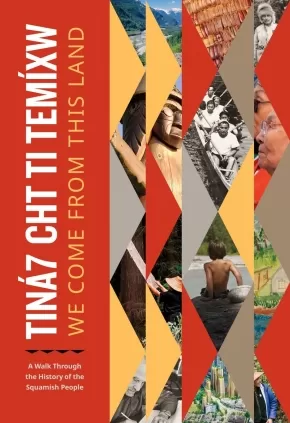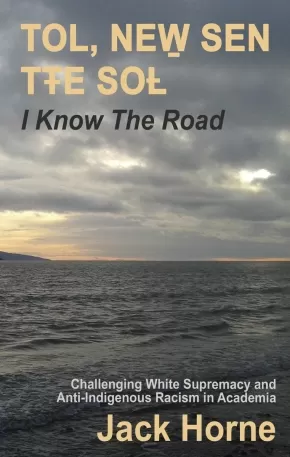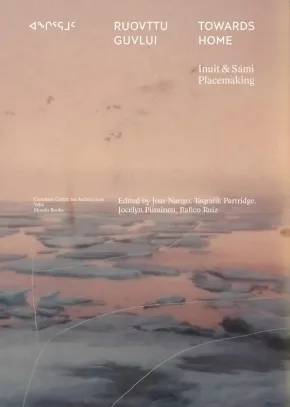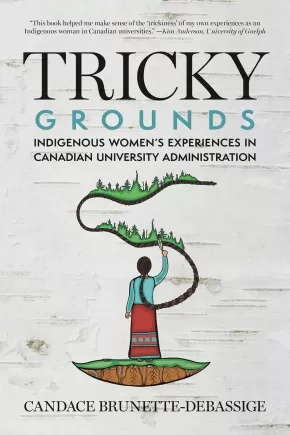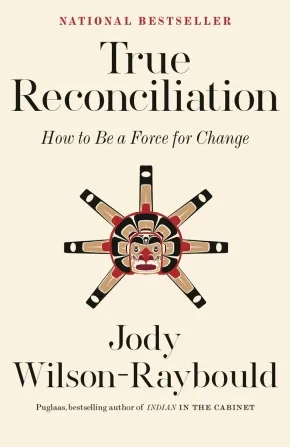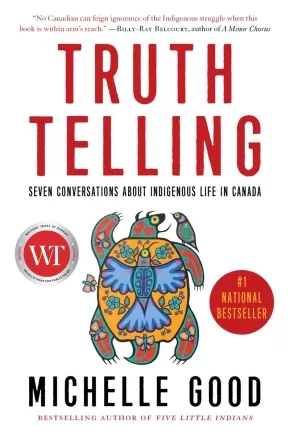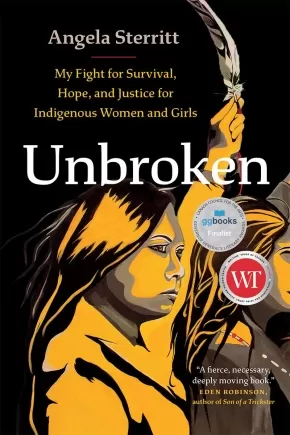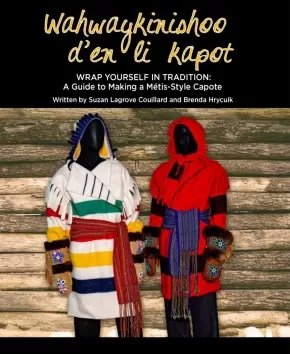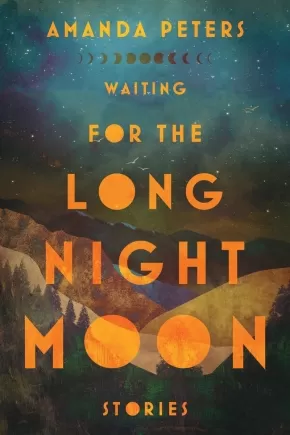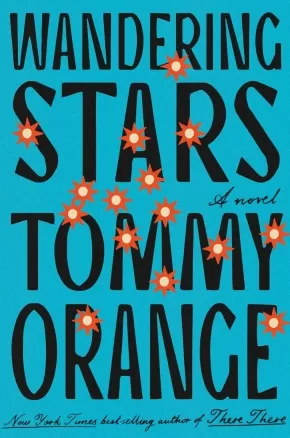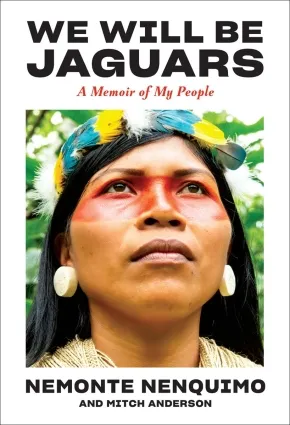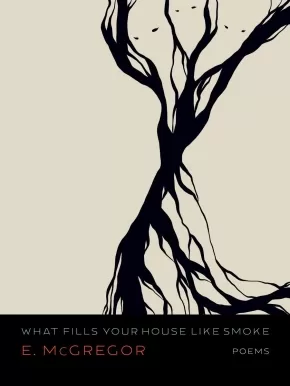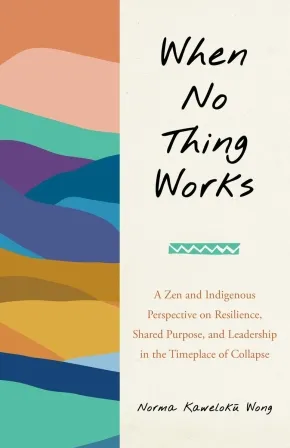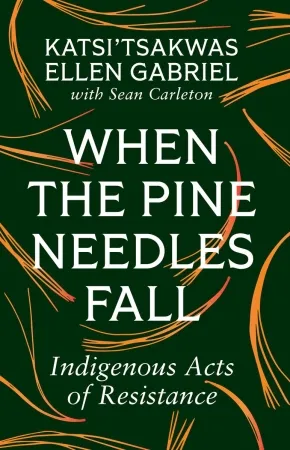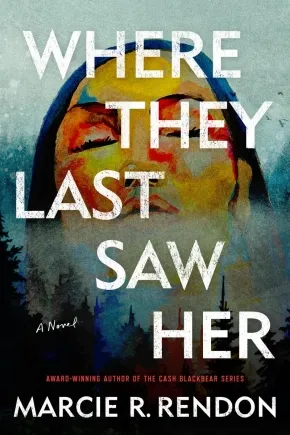Adult Book
Synopsis:
A story of the Sḵwx̱wú7mesh Úxwumixw (Squamish Nation): past, present, and future.
One hundred years after Sḵwx̱wú7mesh (Squamish) leadership signed an amalgamation agreement that declared several communities in Squamish territory as one nation, this accessible history of the Sḵwx̱wú7mesh people traces our stories from ancient times to the present. Tiná7 Cht Ti Temíxw: We Come from This Land offers the culmination of generations of knowledge about the Squamish People and Sḵwx̱wú7meshulh Temíx̱w (Squamish People’s Territory).
Today, we are over 4,100 people and growing, living within Sḵwx̱wú7meshulh Temíx̱w and beyond. Our 6,732-square-kilometre territory includes the watersheds of the Squamish River, Mamquam River, and Howe Sound in the north, and English Bay, False Creek, and Burrard Inlet in the south. It encompasses saltwater and rushing rivers, old-growth forests at valley bottoms, and alpine forests high above the ocean.
Oral histories and archaeological sites demonstrate our relationship with the lands and waters going back over twelve thousand years. Here, we introduce ancient Squamish stories and ways, as well as describe relationships with our neighbours from time immemorial. We discuss early contact with Europeans and the disastrous effects of racism and colonialism, the Indian Act, reserves, and residential schools. We detail our engagement with the imperfect tool of the Canadian judicial system in several significant court cases that have advanced Indigenous rights. And we show how the Squamish Nation is taking back ownership and stewardship within our homelands.
Tiná7 Cht Ti Temíxw: We Come from This Land is a powerful introduction to our vast history and a launching point for discovering more about the different places, people, and stories offered here.
Additional Information
416 pages | 6.50" x 9.50" | Paperback
Synopsis:
Academia remains an unwelcoming space for Indigenous scholars. What space it does cede to Indigenous knowledge is dictated and narrowly defined. W̱SÁNEĆ scholar Jack Horne, author of TOL, NEW̱ SEN TŦE SOȽ: I Know the Road articulates his own negotiation with academia:
“In response to the question of how I, a W̱SÁNEĆ artist and scholar, use embodied W̱SÁNEĆ knowledge in my artistic and academic work, this book advocates for a move away from standard social sciences theories, methodologies and paradigms while forcefully insisting on a W̱SÁNEĆ paradigm.”
To accomplish this constructive goal, Horne argues, “requires a negotiation of embodied W̱SÁNEĆ knowledge, performance studies theory, and western eurocentric social sciences paradigms.”
Written through beautiful storytelling practices with this goal in mind, TOL, NEW̱ SEN TŦE SOȽ: I Know the Road is thus part personal and cultural history, and part contemporary critique. Horne uses a variety of research, letters, and even fragments from his plays, to create a compelling challenge to outmoded academic structures, proposing an alternative that embraces and tools historically suppressed W̱SÁNEĆ ways of knowing. Not only does Horne’s writing confront white supremacy and anti-Indigenous racism in academia, it offers material alternatives to status quo, white-centric pedagogy. With its focus on W̱SÁNEĆ history and knowledge practices, this book offers a praxis of Indigenous knowledge and performance study theory that delivers a unique and deeply valuable pedagogic project.
Additional Information
216 pages | 5.50" x 8.50"| Paperback
Synopsis:
Design and building concepts that pay respect to the land and empower Indigenous communities across the Northern Hemisphere
An Indigenous-led publication, Towards Home explores how Inuit, Sámi and other communities across the Arctic are creating self-determined spaces. This research project, led by Indigenous and settler coeditors, is titled after the phrases angirramut in Inuktitut, or ruovttu guvlui in Sámi, which can be translated as “towards home.” To move towards home is to reflect on where northern Indigenous people find home, on what their connections to their land means and on what these relationships could look like into the future. Framed by these three concepts—Home, Land and Future—the book contains essays, artworks, photographs and personal narratives that express Indigenous notions of home, land, kinship, design and memory. The project emphasizes caring for and living on the land as a way of being, and celebrates practices of space-making and place-making that empower Indigenous communities.
Educator Information
With contributions from Robyn Adams, Ella den Elzen, Liisa-Rávná Finbog, Napatsi Folger, Carola Grahn, Jenni Hakovirta, Elin Kristine Haugdal, Geronimo Inutiq, Ellen Marie Jensen, Tanya Lukin Linklater, Nicole Luke, Reanna Merasty, Johanna Minde, Joar Nango, Taqralik Partridge, Jocelyn Piirainen, Naomi Ratte, Tiffany Shaw, Sunniva Skålnes, Jen Rose Smith, and Olivia Lya Thomassie
Additional Information
352 pages | 6.75" x 9.50" | 150 Illustrations | Paperback
Synopsis:
Breaks the deafening silence of Indigenous women’s voices in academic leadership positions.
Since the 2015 release of the report on the Truth and Reconciliation Commission of Canada, new Indigenous policies have been enacted in universities and a variety of interconnecting Indigenous senior administrative roles have been created. Many of these newly created roles have been filled by Indigenous women. But what does it mean for Indigenous women to be recruited to Indigenize Western institutions that have not undergone introspective, structural change?
Informed by her own experiences and the stories of other Indigenous women working in senior administrative roles in Canadian universities, Candace Brunette-Debassige explores the triple-binding position Indigenous women often find themselves trapped in when trying to implement reconciliation in institutions that remain colonial, Eurocentric, and male-dominated. The author considers too the gendered, emotional labour Indigenous women are tasked with when universities rush to Indigenize without the necessary preparatory work of decolonization.
Drawing on an Indigenous feminist decolonial theoretical lens and positioning Indigenous story as theory, Brunette-Debassige illustrates how Indigenous women can and do preserve and enact their agency through resistance, and help lead deeper transformative changes in Canadian universities. Ultimately, her work provides a model for how reconciliation and Indigenization can be done at an institutional level.
Reviews
“This book helped me make sense of the ‘trickiness’ of my own experiences as an Indigenous woman in Canadian universities.” —Kim Anderson, University of Guelph
Additional Information
320 pages | 6.00" x 9.00" | Paperback
Synopsis:
There is one question Canadians have asked Jody Wilson-Raybould more than any other: What can I do to help advance reconciliation? It is clear that people from all over the country want to take concrete and tangible action that will make real change. We just need to know how to get started. This book provides that next step. For Wilson-Raybould, what individuals and organizations need to do to advance true reconciliation is self-evident, accessible, and achievable. True Reconciliation is broken down into three core practices—Learn, Understand, and Act—that can be applied by individuals, communities, organizations, and governments.
The practices are based not only on the historical and contemporary experience of Indigenous peoples in their relentless efforts to effect transformative change and decolonization, but also on the deep understanding and expertise about what has been effective in the past, what we are doing right, and wrong, today, and what our collective future requires. Fundamental to a shared way of thinking is an understanding of the Indigenous experience throughout the story of Canada. In a manner that reflects how work is done in the Big House, True Reconciliation features an “oral” history of these lands, told through Indigenous and non-Indigenous voices from our past and present.
The ultimate and attainable goal of True Reconciliation is to break down the silos we’ve created that prevent meaningful change, to be empowered to increasingly act as “inbetweeners,” and to take full advantage of this moment in our history to positively transform the country into a place we can all be proud of.
Additional Information
352 pages | 5.17" x 7.99" | Paperback
Synopsis:
A bold, provocative collection of essays exploring the historical and contemporary Indigenous experience in Canada.
With authority and insight, Truth Telling examines a wide range of Indigenous issues framed by Michelle Good’s personal experience and knowledge.
From racism, broken treaties, and cultural pillaging, to the value of Indigenous lives and the importance of Indigenous literature, this collection reveals facts about Indigenous life in Canada that are both devastating and enlightening. Truth Telling also demonstrates the myths underlying Canadian history and the human cost of colonialism, showing how it continues to underpin modern social institutions in Canada.
Passionate and uncompromising, Michelle Good affirms that meaningful and substantive reconciliation hinges on recognition of Indigenous self-determination, the return of lands, and a just redistribution of the wealth that has been taken from those lands without regard for Indigenous peoples.
Truth Telling is essential reading for those looking to acknowledge the past and understand the way forward.
Reviews
“With blistering clarity, Michelle Good exposes the contradictions at the heart of Canada, but also imagines beyond them, setting out a specific vision for an Indigenous future governed by us. Good’s essays, woven with personal testimony, are deeply researched and traverse great swaths of history and policy; they are also very rousing and moving. No Canadian can feign ignorance of the Indigenous struggle when this book is within arm’s reach.” — Billy-Ray Belcourt, author of A Minor Chorus
"Good reminds us what the truth in Truth and Reconciliation actually requires of all of us: Indigenous peoples and Canadians. Addressing storytelling and historical myth-making, this book would have changed my nineteen-year-old world had it been available and rendered normative for my teachers. Good’s work is formidable, elemental and reminiscent of Cardinal’s Unjust Society. This work, should be required reading for every Canadian. Smart, generous and insightful. 'There is no such thing as Crown Land. It is all Indigenous land.' Good writes. This truth resonates. Serves notice: it is time." — Dr. Tracey Lindberg, Law Professor, author of Birdie
“Truth Telling is at once heartfelt, instructive, and authentic, expertly exploring the key issues that have shaped the Indigenous reality in Canada.… This collection is an indispensable resource.” — Waubgeshig Rice, author of Moon of the Crusted Snow
“As Canadians search for a national approach to reconciliation... this book reminds us of how we arrived at this moment.…[and] is the kind of reference that will help us navigate our fraught journey.” — Dr. Eldon Yellowhorn, Professor of Indigenous Studies, Simon Fraser University
“Truth Telling is a powerful, urgent, and necessary book that gets to the heart of true reconciliation and maps a course for achieving it. Bridging personal stories and lived experiences with sharp historical analysis, Michelle Good’s writing is both beautiful and heartbreaking. Honest, forthright, and powerful, Truth Telling offers insights and analysis that every policymaker and politician—indeed, any person who calls Canada “home”— can and must read. Urgently.” — 2023 Balsillie Prize for Public Policy Jury
Educator Information
Truth Telling is a collection of essays about the contemporary Indigenous experience in Canada.
Additional Information
232 pages | 5.00" x 7.50" | Paperback
Synopsis:
Unbroken is an extraordinary work of memoir and investigative journalism focusing on missing and murdered Indigenous women and girls, written by an award-winning Gitxsan journalist who survived life on the streets against all odds.
As a Gitxsan teenager navigating life on the streets, Angela Sterritt wrote in her journal to help her survive and find her place in the world. Now an acclaimed journalist, she writes for major news outlets to push for justice and to light a path for Indigenous women, girls, and survivors. In her brilliant debut, Sterritt shares her memoir alongside investigative reporting into cases of missing and murdered Indigenous women in Canada, showing how colonialism and racism led to a society where Sterritt struggled to survive as a young person, and where the lives of Indigenous women and girls are ignored and devalued.
Growing up, Sterritt was steeped in the stories of her ancestors: grandparents who carried bentwood boxes of berries, hunted and trapped, and later fought for rights and title to that land. But as a vulnerable young woman, kicked out of the family home and living on the street, Sterritt inhabited places that, today, are infamous for being communities where women have gone missing or been murdered: Vancouver's Downtown Eastside, and, later on, Northern BC's Highway of Tears. Sterritt faced darkness: she experienced violence from partners and strangers and saw friends and community members die or go missing. But she navigated the street, group homes, and SROs to finally find her place in journalism and academic excellence at university, relying entirely on her own strength, resilience, and creativity along with the support of her ancestors and community to find her way.
"She could have been me," Sterritt acknowledges today, and her empathy for victims, survivors, and families drives her present-day investigations into the lives of missing and murdered Indigenous women. In the end, Sterritt steps into a place of power, demanding accountability from the media and the public, exposing racism, and showing that there is much work to do on the path towards understanding the truth. But most importantly, she proves that the strength and brilliance of Indigenous women is unbroken, and that together, they can build lives of joy and abundance.
Reviews
"Sterritt's story is living proof of how courageous Indigenous women are. Listen to her voice and hear the sound of the land, hear the sound of our women weeping but also raging—refusing to be neglected or ignored any longer."—Tanya Talaga, author of Seven Fallen Feathers and All Our Relations
"A fierce, necessary, deeply moving book. Sterritt uses her difficult personal journey to frame the terrible history of missing and murdered Indigenous women in Canada. Haunting and illuminating."— Eden Robinson, author of Son of a Trickster
"Angela Sterritt takes on Canada's deeply flawed justice system, deftly exposing systemic racism and the continuing impacts of colonialism. This book is a compelling read and a well-researched and powerful heart-centered memoir."—Lorimer Shenher, author of That Lonely Section of Hell
"With facts and humanity, Angela Sterritt effortlessly draws us into this emotional and important read. A courageous Indigenous voice who uses her personal journey to educate all of us about critical and urgent issues we must address, including Missing and Murdered Indigenous Women and Girls."— Jody Wilson-Raybould
"A new clear, compelling, and urgent voice illuminates a critical topic of our times with the passion and profound caring of a devoted sister. A tour de force."—Darrel McLeod, author of Mamaskatch and Peyakow
"A remarkable life story. . . Angela Sterritt is a formidable storyteller and a passionate advocate."—Cherie Dimaline, author of The Marrow Thieves
"[A] thought-provoking memoir. . . Beginning with a haunting list of names of Indigenous women and girls who were either murdered or missing along the Highway of Tears, the book tells the stories of such ignored and abused victims. . . The final product is eyeopening, making use of tragic firsthand accounts from grieving families and Sterritt's personal memories, all raw and rich with detail. . . [P]owerful."—Foreword Reviews
Additional Information
6.00" x 9.00" | Paperback
Synopsis:
Follow in the tradition of your ancestors as you learn how to hand sew your capote, a hand-sewn coat made from a wool blanket. Wahwaykinishoo d’en li kapot – Wrap Yourself in Tradition: A Guide to Making a Métis-Style Capote also includes the history of the capote and its connection to Métis heritage. Enjoy the experience, feel the warmth, share the feeling, and wear it with pride. Written by Suzan Lagrove Couillard and Brenda Hrycuik.
Additional Information
57 Pages | 10" x 8.5" | Spiral Bound
Synopsis:
In her debut collection of short fiction, Amanda Peters describes the Indigenous experience from an astonishingly wide spectrum in time and place—from contact with the first European settlers, to the forced removal of Indigenous children, to the present-day fight for the right to clean water.
In this intimate collection, Peters melds traditional storytelling with beautiful, spare prose to describe the dignity of the traditional way of life, the humiliations of systemic racism and the resilient power to endure. A young man returns from residential school only to realize he can no longer communicate with his own parents. A young woman finds purpose and healing on the front lines as a water protector. An old man remembers his life as he patiently waits for death. And a young girl nervously dances in her first Mawi’omi. The collection also includes the story “The Berry Pickers,” which inspired Peters’ critically acclaimed novel of the same name, as well as the Indigenous Voices Award–nominated story “Pejipug (Winter Arrives).”
At times sad, sometimes disturbing but always redemptive, the stories in Waiting for the Long Night Moon will remind you that where there is grief there is also joy, where there is trauma there is resilience and, most importantly, there is power.
Educator Information
Waiting for the Long Night Moon is a collection of short stories.
Additional Information
256 pages | 6.00" x 9.00" | Paperback
Synopsis:
The eagerly awaited follow-up to Pulitzer Prize finalist Tommy Orange’s breakout best seller There There—winner of the PEN/Hemingway Award, the John Leonard Prize, the American Book Award, and one of the New York Times Ten Best Books of the Year—Wandering Stars traces the legacies of the Sand Creek Massacre of 1864 and the Carlisle Industrial School for Indians through to the shattering aftermath of Orvil Redfeather’s shooting in There There.
Colorado, 1864. Star, a young survivor of the Sand Creek Massacre, is brought to the Fort Marion Prison Castle, where he is forced to learn English and practice Christianity by Richard Henry Pratt, an evangelical prison guard who will go on to found the Carlisle Industrial School for Indians, an institution dedicated to the eradication of Native history, culture, and identity. A generation later, Star’s son, Charles, is sent to the school, where he is brutalized by the man who was once his father’s jailer. Under Pratt’s harsh treatment, Charles clings to moments he shares with a young fellow student, Opal Viola, as the two envision a future away from the institutional violence that follows their bloodline.
Oakland, 2018. Opal Viola Victoria Bear Shield is barely holding her family together after the shooting that nearly took the life of her nephew Orvil. From the moment he awakens in his hospital bed, Orvil begins compulsively googling school shootings on YouTube. He also becomes emotionally reliant on the prescription medications meant to ease his physical trauma. His younger brother Lony, suffering from PTSD, is struggling to make sense of the carnage he witnessed at the shooting by secretly cutting himself and enacting blood rituals which he hopes will connect him to his Cheyenne heritage. Opal is equally adrift, experimenting with Ceremony and peyote, searching for a way to heal her wounded family.
Extending his constellation of narratives into the past and future, Tommy Orange once again delivers a story that is by turns shattering and wondrous, a book piercing in its poetry, sorrow, and rage—a masterful follow-up to his already—classic first novel, and a devastating indictment of America’s war on its own people.
Additional Information
336 pages | 5.50" x 8.25" | Hardcover
Synopsis:
From a fearless, internationally acclaimed activist comes an impassioned memoir about an indigenous childhood, a clash of cultures, and the fight to save the Amazon rainforest
We Will Be Jaguars is an astonishing memoir by an equally astonishing woman. Nenquimo is a winner of TIME magazine’s Earth Award, and MS. magazine named this book among the Most Anticipated Feminist Books of 2024.
Born into the Waorani tribe of Ecuador’s Amazon rainforest—one of the last to be contacted by missionaries in the 1950s—Nemonte Nenquimo had a singular upbringing.
She was taught about plant medicines, foraging, oral storytelling, and shamanism by her elders. At age fourteen, she left the forest for the first time to study with an evangelical missionary group in the city. Eventually, her ancestors began appearing in her dreams, pleading with her to return and embrace her own culture. She listened.
Two decades later, Nemonte has emerged as one of the most forceful voices in climate change activism. She has spearheaded the alliance of indigenous nations across the Upper Amazon and led her people to a landmark victory against Big Oil, protecting over a half million acres of primary rainforest. Her message is as sharp as a spear—honed by her experiences battling loggers, miners, oil companies and missionaries.
In We Will Be Jaguars, she partners with her husband, Mitch Anderson, founder of Amazon Frontlines, digging into generations of oral history, uprooting centuries of conquest, hacking away at racist notions of indigenous peoples, and ultimately revealing a life story as rich, harsh, and vital as the Amazon rainforest herself.
Reviews
“If you want to understand the climate crisis and do something about it, read this book. Nemonte’s writing is as provocative as it is inspiring, a heroine speaking her truth which is exactly what we need to hear. Had we listened long ago to these voices we wouldn’t be in the eye of the storm now.” — Emma Thompson
“Everyone should read this––never has a book been more urgent. Truly soul-stirring, Nemonte’s book is a radical manifesto for our times. It moved me to tears. Her story flows like a mighty river, and I was utterly taken by its current.”— Vanessa Kirby, actress and activist
"Full of wisdom, sadness, flourishes of joy and more than a few psychedelic visions, We Will Not be Saved is testament not only to Nenquimo’s resilience but also her deep spiritual connection to her land and ancestors. ... [It] plant[s] readers right in the heart of the rainforest, immersing them in its sounds, smells and kaleidoscopic landscapes. Many are the memoirs that profess to tell untold stories, but here that claim is watertight." — The Guardian
Additional Information
368 pages | 6.00" x 9.00" | Hardcover
Synopsis:
In these poems, E. McGregor combines the lore of family history with personal memory, vividly parsing patterns of inheritance, particularly through the maternal line.
What Fills Your House Like Smoke begins and ends at the deathbed of the writer's Metis grandmother. In between, McGregor composes an incomplete and wildly imaginative biography of the grandmother, interrogated by family photographs, stories, and the scant paper trail she left behind.
McGregor sifts through the complexities of motherhood, daughterhood, anxiety, intimate relationships and addiction, weaving family history with memory to make sense of what is carried on. Especially affecting are poems about childhood, and the people who disappear from a child's life, and the struggle to live as a societal outsider, finding strength in self-definition and the power of narrative.
As these poems unfold, they move us toward an understanding of maternal inheritance, shifting identities, forgiveness, and finally love.
Reviews
"There is a rawness and tender vulnerability in the re-membering of a mother's mother's life in the thematic dotted lines, hardlines and blurred lines of McGregor's poetry. For bodies under duress, survival is instinctive and passed on, and a breakthrough from the trauma endured is made possible in an honest remembering to liberate oneself." -- Rita Bouvier, author of a beautiful rebellion
"What Fills Your House Like Smoke is a staggering collection . . . technically agile and thematically nuanced. McGregor's poems have the effect of flame, sucking the air out of the room; of a soothing hand on your chest, reminding you to breathe. An indelible debut." -- Hollay Ghadery, author of Rebellion Box
Additional Information
90 pages | 6.00" x 8.00" | Paperback
Synopsis:
Spiritual and community lessons for embracing collective care, co-creating sustainable worlds, and responsibly meeting uncertain futures—a Zen and Indigenous take on building better, more balanced ways of being
Talking story, weaving poetry, and offering wisdom at the intersections of strategy, politics, and spiritual activism, When No Thing Works is a visionary guide to co-creating new worlds from one in crisis. It asks into the ways we can live well and maintain our wholeness in an era of collective acceleration: the swiftly moving current, fed and shaped by human actions, that sweeps us toward ever uncertain futures. Grounded in Zen Buddhism, interconnection, and decades of community activism, When No Thing Works explores questions like:
- As we stand at a threshold of collective change, what leaps must we make?
- How can we push through discord and polarization and meet these critical changepoints collectively?
- What practices, strategies, and spiritualities can align to vision a sustainable future for our communities and descendants?
- How can we step out of urgency to tend to our crises with wisdom, intention, and care?
With wise and witty prose that wanders and turns, guides and reveals, Zen master and Indigenous Hawaiian leader Rōshi Norma Wong’s meditation holds our collective moment with gravity and tender care. She asks us to not only imagine but to live into a story beyond crisis and collapse—one that expands to meet our dreams of what (we hope) comes next, while facing with clarity and grace our here and now in the world we share today.
Reviews
“Norma Ryuko Kawelokū Wong explores the essence of a twenty-first-century Indigenous worldview in When No Thing Works. She relies on knowing that all things, past and future, are in relationship. What we imagine and how we walk in the present determines the future. As Norma signals, our walk must include leaps that take us into unknowns, but we will not be alone. Norma gives us wise counsel for this difficult moment on Mother Earth. One culture, one belief system, one community alone is unable to fulfill our ancestors’ collective hopes for all of our descendants. As Norma’s ancestors said, ‘O ka ehu kakahiaka . . . The red dawn of our people became the red dawn of many peoples.’ Hawwih (thank you in Caddo), Norma, your family, and your people!”—Judith LeBlanc, citizen of the Caddo Nation, ekah (grandmother), and executive director of the Native Organizers Alliance
“As we stand at the threshold of collapsing systems and broken hearts, there is an opening. In When No Thing Works, Rōshi Norma Wong gives us a compass for how to navigate the space in between where we are coming from and where we are going. This book is an invitation to practice who we need to be to meet this moment and shape a future of possibility and potential.”—Kerri Kelly, author of American Detox
Additional Information
120 pages | 5.51" x 8.51" | 6 b&w photos | Paperback
Synopsis:
There have been many things written about Canada’s violent siege of Kanehsatà:ke and Kahnawà:ke in the summer of 1990, but When the Pine Needles Fall: Indigenous Acts of Resistance is the first book from the perspective of Katsi’tsakwas Ellen Gabriel, who was the Kanien’kehá:ka (Mohawk) spokesperson during the siege. When the Pine Needles Fall, written in a conversational style by Gabriel with historian Sean Carleton, offers an intimate look at Gabriel’s life leading up to the 1990 siege, her experiences as spokesperson for her community, and her work since then as an Indigenous land defender, human rights activist, and feminist leader.
More than just the memoir of an extraordinary individual, When the Pine Needles Fall offers insight into Indigenous language, history, and philosophy, reflections on our relationship with the land, and calls to action against both colonialism and capitalism as we face the climate crisis. Gabriel’s hopes for a decolonial future make clear why protecting Indigenous homelands is vital not only for the survival of Indigenous peoples, but for all who live on this planet.
Awards
- 2025 Canadian Historical Association Indigenous History Book Prize
- 2025 Errol Sharpe Book Prize
- 2025 Wilson Institute Book Prize
Reviews
“When the Pine Needles Fall is a profound treatise and manifesto chronicling Haudenosaunee resistance to land theft by one of the most important Land Defenders of our time. Gabriel’s work is the book on Indigenous resistance I’ve been waiting for my whole life. It is a must-read for anyone concerned with the continuation of life on this planet.” — Leanne Betasamosake Simpson, co-author of “Rehearsals for Living”
“Katsi’tsakwas Ellen Gabriel’s words in When the Pine Needles Fall are gifts that serve as a beacon of light by igniting our hearts, minds, and spirits. Through her boundless wisdom grounded in healing work as a Land Defender on Turtle Island, she calls for fierce Indigenous resistance and radical global solidarity to put an end to root causes of oppression worldwide: capitalism, patriarchy, and settler colonialism. Gabriel reminds us that a more just, kind, and caring world—where all life is precious—is possible for the next seven generations, but only if we fight for it.” — Samir Shaheen-Hussain, MD, author of “Fighting for A Hand to Hold: Confronting Medical Colonialism against Indigenous Children in Canada”
“When the Pine Needles Fall is a remarkable and revelatory account of the 1990 siege of Kanehsatà:ke and Kahnawà:ke, when provincial, municipal, and national armed forces targeted these Mohawk communities. It is also one of the best first-hand accounts of Indigenous activism that I have ever read, relayed in moving and extraordinary form. An essential addition to contemporary First Nations history and the growing field of Indigenous Studies.” — Ned Blackhawk, Western Shoshone, author of “The Rediscovery of America: Native Peoples and the Unmaking of U.S. History”
“As a treatise on women and culture-based governance from a remarkable Haudenosaunee leader, When the Pine Needles Fall offers me hope and renewed energy. Through her life work, Ellen Gabriel demonstrates how to persevere, remain optimistic, and continue with creative and activist endeavours. The book effectively situates the ‘crisis’ within its centuries-long context, marking a tipping point for Canada while highlighting ongoing challenges. It also examines how mainstream narratives are constructed around Indigenous struggles, providing a comprehensive profile of Gabriel’s diverse contributions to Indigenous resistance and resurgence.” — Kim Anderson, author of“ Life Stages and Native Women: Memory, Teachings, and Story Medicine”
“Katsi’tsakwas Ellen Gabriel’s personal account of the 1990 siege of Kanehsatà:ke and Kahnawà:ke is a crucial contribution to our understanding of these dramatic events and of the political context of the time. Her lifetime dedication to the defence of Indigenous peoples and women’s rights is truly exemplary and constitutes an inspiration for generations to come.” — Bernard Duhaime, professor, Faculty of Political Science and Law, Université du Québec à Montréal
“In When the Pine Needles Fall, celebrated activist Katsi’tsakwas Ellen Gabriel gifts us with an expansive account of the 1990 siege of Kanehsatà:ke and Kahnawà:ke. This alone provides a captivating analysis of this seminal moment and its legacy within larger movements for Indigenous sovereignty on Turtle Island. But Gabriel, an artist, also paints the negative space, braiding her relationship to the land, Kanien’kehá:ka teachings, and the language with her tireless work against settler colonialism, extractive capitalism, and patriarchy. This essential book is an inspiring conversation reminding us that decolonization is world-building rooted in an ethics of relationality and care.” — Nazila Bettache, MD, MPH; assistant professor of medicine, Université de Montréal; social justice organizer and co-editor of “Reflections on Illness”
“I honour my sister whose words speak the truth. One of the most powerful quotes by Katsi’tsakwas is: ‘I’m a Kanien’kehá:ka woman who cares deeply about our land and I want a better future for the generations to come.’ Everything she speaks about in this book is directly connected to these words.” — Beverley Jacobs, CM, LLB, LLM, PhD; Kanien’kehá:ka, Bear Clan, Six Nations Grand River Territory; associate professor, Faculty of Law, University of Windsor
Additional Information
280 pages | 5.50" x 8.50" | Paperback
Synopsis:
From the award-winning author of the Cash Blackbear series comes a compelling novel of a Native American woman who learns of the disappearance of one of her own and decides enough is enough.
All they heard was her scream.
Quill has lived on the Red Pine reservation in Minnesota her whole life. She knows what happens to women who look like her. Just a girl when Jimmy Sky jumped off the railway bridge and she ran for help, Quill realizes now that she’s never stopped running. As she trains for the Boston Marathon early one morning in the woods, she hears a scream. When she returns to search the area, all she finds are tire tracks and a single beaded earring.
Things are different now for Quill than when she was a lonely girl. Her friends Punk and Gaylyn are two women who don’t know what it means to quit; her loving husband, Crow, and their two beautiful children challenge her to be better every day. So when she hears a second woman has been stolen, she is determined to do something about it—starting with investigating the group of men working the pipeline construction just north of their homes.
As Quill closes in on the truth about the missing women, someone else disappears. In her quest to find justice for all of the women of the reservation, she is confronted with the hard truths of their home and the people who purport to serve them. When will she stop losing neighbors, friends, family? As Quill puts everything on the line to make a difference, the novel asks searing questions about bystander culture, the reverberations of even one act of crime, and the long-lasting trauma of being considered invisible.
Reviews
“Rendon’s book will break your heart, but it will also inspire and inform.”—Kirkus Review
“Rendon masterfully navigates the histories of trauma and brutality that continue to exist within our Native communities, laying bare the truths of colonial violence and the continuing need for closure and justice in our homelands.”—Ramona Emerson, author of Shutter
“An expert and uncompromising storyteller, Marcie Rendon aims her extraordinary powers on a no-holds barred story that will devastate and enrage you—and renew your belief in the power of community and the strength in women’s hearts. Where They Last Saw Her is unmissable.”—Katie Gutierrez, bestselling author of More Than You’ll Ever Know
Additional Information
336 Pages | 5.5" x 8.25" | Paperback

